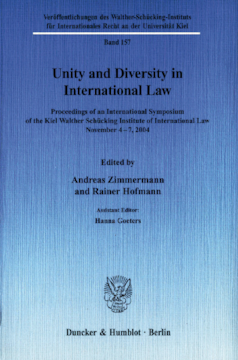Unity and Diversity in International Law

BOOK
Cite BOOK
Style
Format
Unity and Diversity in International Law
Proceedings of an International Symposium of the Kiel Walther Schücking Institute of International Law, November 4-7, 2004
Editors: Zimmermann, Andreas | Hofmann, Rainer
Veröffentlichungen des Walther-Schücking-Instituts für Internationales Recht an der Universität Kiel, Vol. 157
(2006)
Additional Information
Book Details
Pricing
Abstract
This publication is the result of a symposium held in 2004 at the Kiel Walther Schücking Institute for International Law on the occasion of its 90th anniversary. In 2000 the International Law Commission of the United Nations in its preliminary study on dangers associated with conflicts between various normative subsystems of international law stated that the fragmentation of international law could endanger the stability as well as the consistency of international law and its comprehensive nature.It is against this background that this volume contains an in-depth analysis as to whether divergent trends have emerged, and if so to what extent, with regard to the sources of international law, its subjects, questions of State responsibility and dispute settlement with regard to the law of the sea, international humanitarian and international criminal law, human rights, international environmental law and international economic law. Besides, the book also addresses the question whether, and if so which, rules have developed to cope with conflicts between the various subsystems just mentioned. It therefore constitutes an essential contribution to the ongoing and crucial debate on the fragmentation of modern public international law.
Table of Contents
| Section Title | Page | Action | Price |
|---|---|---|---|
| Foreword | 5 | ||
| Contents | 7 | ||
| Abbreviations | 11 | ||
| The Walther Schücking Institute at 90. Jost Delbrück | 15 | ||
| Introductory Remarks | 21 | ||
| Rainer Hofmann | 21 | ||
| Andreas Zimmermann | 23 | ||
| Questionnaire International Law of the Sea. Doris König | 27 | ||
| Questionnaire International Humanitarian Law. Anne Peters and Hans Wolfram Kessler | 65 | ||
| Questionnaire Human Rights and the Unity-Diversity Divide. Eibe Riedel | 111 | ||
| Questionnaire International Environmental Law. Peter-Tobias Stoll | 135 | ||
| Questionnaire International Economic Law. Christian Tietje | 169 | ||
| Unity and Diversity with Regard to International Treaty Law. Monika Heymann | 217 | ||
| Comment by Marcelo Kohen | 241 | ||
| Comment by Alain Pellet | 247 | ||
| Comment by Jürgen Bröhmer | 253 | ||
| Unity and Diversity in the Formation and Relevance of Customary International Law. Anja Seibert-Fohr | 257 | ||
| Comment by Vera Gowlland-Debbas | 285 | ||
| Comment by Fred L. Morrison | 295 | ||
| Comment by Torsten Stein | 299 | ||
| Non-State Actors: Their Role and Impact on the Fragmentation of International Law. Robin Geiß | 303 | ||
| Comment by Gerhard Hafner | 329 | ||
| Comment by Jordan J. Paust | 335 | ||
| Comment by Daniel Thürer | 339 | ||
| Domestic Implementation and the Unity of International Law. Stephan Wittich | 345 | ||
| Comment by Ahmed Abou-el-Wafa | 373 | ||
| Comment by Eyal Benvenisti | 377 | ||
| Comment by Zdzisław Kędzia | 379 | ||
| Comment by Christian Tomuschat | 385 | ||
| Unity and Diversity of International Law in the Settlement of International Disputes. Beate Rudolf | 389 | ||
| Comment by Stefan Oeter | 419 | ||
| Comment by Peter Tomka | 425 | ||
| Comment by Rüdiger Wolfrum | 433 | ||
| Unity and Diversity in the Law of State Responsibility. Christian J. Tams | 437 | ||
| Comment by Carlos Espósito Massicci | 461 | ||
| Comment by Matthias Herdegen | 463 | ||
| Comment by Bruno Simma | 467 | ||
| Overall Statements | 471 | ||
| Jost Delbrück | 471 | ||
| Doris König | 473 | ||
| Anne Peters | 477 | ||
| Eibe Riedel | 481 | ||
| Peter-Tobias Stoll | 485 | ||
| Christian Tietje | 487 | ||
| Concluding Remarks. Rainer Hofmann | 491 | ||
| List of Participants | 495 |
